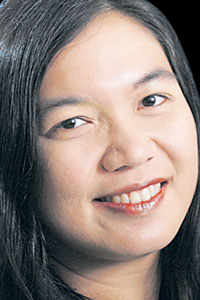From Oct 29 last year on, almost everyone who has paid respect to the late King Bhumibol Adulyadej at the Grand Palace has received a photo of the royal urn and a small packet of rice grains as tokens of his memory. What is special about the rice is the label saying "sufficiency", specially designed from the King's handwriting. Most recipients keep the rice grains on altars at home in loving memory of King Rama IX. Many farmers keep them for their rice farming while some want to grow rice and follow his sufficiency-economy principles. As a frequent palace visitor, I keep one packet for myself and give the other to my housemaid to plant in her rice field in Si Sa Ket province.
The idea of government agencies giving people rice was inspired by the importance King Bhumibol placed on rice farming and the way he encouraged his people to live with moderation and self-sufficiently. The King supported research and development on rice quality and cultivation to ensure food sustainability.
Over the past month, I have read people's opinions on what to do with the rice grains. Interestingly, a few Bangkokians have already started to cultivate rice by soaking the grains in water for a night, then wrapping them in wet tissue paper for two nights and planting new saplings in the soil or tree pots.
Since the passing of King Bhumibol on October 13, many Thais have vowed to follow in his footsteps by doing good and adhering to his principles. One of the King's well-known principles was called the Principle of Sufficiency. Back in 1974, the King delivered a birthday speech: "Let other people say what they want. They may say Thailand is old-fashioned, or Thailand is not modern. But we live sufficiently and I hope everyone has the wish to make Thailand a sufficient place. We may not prosper splendidly, but we live in sufficiency and peace compared to other countries. If we maintain this state of sufficiency, we may soon prosper splendidly."
In 1998, King Rama IX remarked on his birthday: "The word 'self-sufficient' has a broader meaning, which is 'feeling your life is good enough'. If people feel their lives are good enough, they have little greed. When they have little greed, they do not cause grievances to other people ... If people adhere to the principle of self-sufficiency -- living in moderation, being honest and not greedy -- they live happily. If they are well-off, they can have luxuries, but must not cause grievance to others."
In brief, to live according to the self-sufficiency principle is to be thrifty, cut unnecessary expenses, earn a decent and honest living, refrain from fierce competition, keep learning and working, live decent lives, and refrain from bad deeds.
King Bhumibol used the phrase "sufficiency economy" for the first time in 1997, when Thailand experienced an economic crisis. "If we start to do what we can, to be self-sufficient, we can live without trouble ... If we can convert to the sufficiency economy -- not all of us, not even half but only one fourth -- we can continue our living ... It is not important to become an economic tiger. What matters is for us to have a sufficiency economy. Sufficiency means self-supporting or having enough for ourselves. Sufficiency does not mean every household will have to produce its own food or weave its own clothes. That would be extreme. But there should be sufficiency at a village or district level. If there is a surplus, it can go for sale."
In addition, his New Theory is a good example of applying the sufficiency principle to agriculture. Land should be divided into four portions. The first 30% should be dug and turned into ponds for keeping rainwater for watering plants in dry season and feeding animals. The second 30% is for growing rice for consumption within the family. The third 30% is for growing fruit trees, vegetables, economic crops, herbs and more for consumption and sale. The rest is for living, animal raising, mushroom farming, fertiliser-making and more.
The next step is to encourage farmers to work together as groups or co-operatives to farm, do marketing, find adequate food and clothes for themselves, find health and financial welfare for their communities, and support education and religion.
The third step is the way farmer groups find sources of money for investment and life improvement. Farmers should be able to sell rice at fairly high prices and buy food and commodity goods in bulk at low prices, while loan sources and private firms can buy rice directly from farmers.
In all, the New Theory enables farmers to stand on their own feet at a certain level by helping each other, having rice to eat all year round with no need to buy, and have enough water (1,000m³ rai per year) for farming.
As my family has long grown certain kinds of vegetables -- such as holy basil, limes and red chillis -- in our backyard, I start thinking about rice farming in tree pots for consumption. From now on, I have to let my housemaid down by keeping the rice grains for my rice farming at home.
Pichaya Svasti is a travel writer of the Life section of the Bangkok Post.
